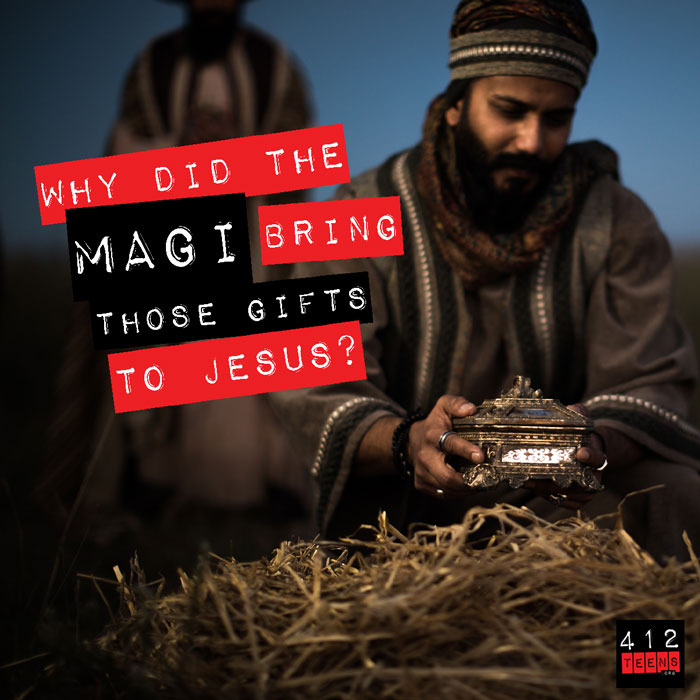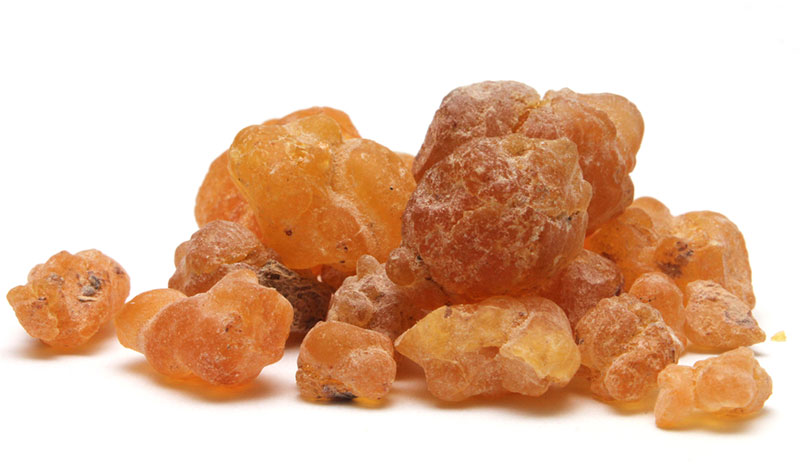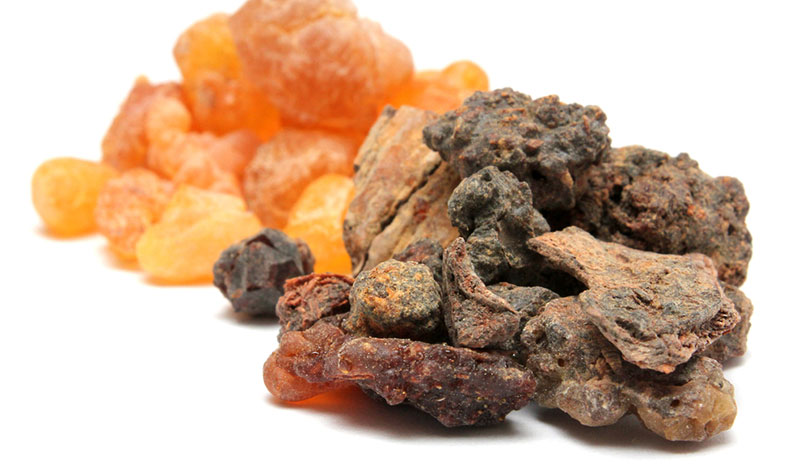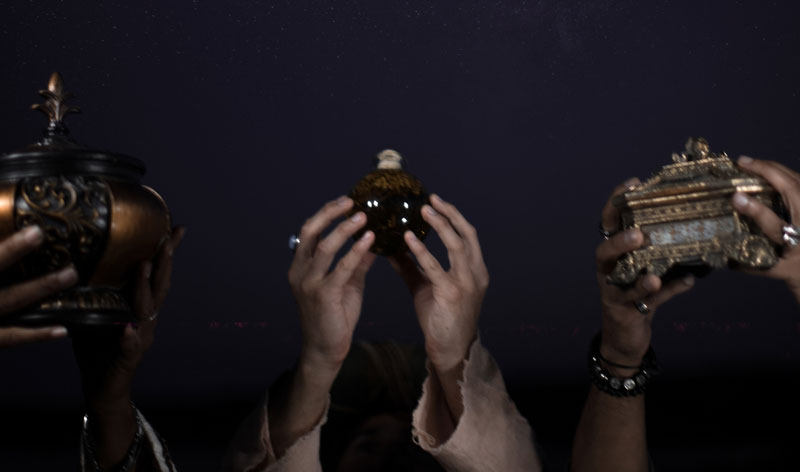Why did the Magi bring gold, frankincense, and myrrh to Jesus?

No Christmas pageant is complete without the three wise men bringing their gifts to Jesus. But why did they bring these costly gifts? Gold is understandable, but frankincense and myrrh? What in the world are those for? While the Bible doesn't specifically tell us their significance, there are some cultural traditions surrounding these items that can help us understand why the Magi might have brought these three treasures.
For instance, although some of these valuable gifts are strange to us, these were considered standard gifts to honor a king or deity in the ancient world. King Seleucus II Callinicus offered these same three items to his "god" Apollo at a temple in Miletus in 242 B.C.1
Matthew 2:1-12 tells the story of the Magi who recognized the star that appeared in the sky for what it was: a sign that a king had been born in Israel. They gathered treasures that would be understood and welcomed for a newborn king—gold and frankincense and myrrh.

Gold
Besides the obvious value of bringing gold to a king as a precious metal and valuable commodity, another reason why the wise men might have brought gold is because some traditions say that it is a symbol of divinity. For example, pagan idols were often made from gold.
So this gift could have been seen as an act of worship or acknowledgment of Jesus' divinity—God in the flesh—as well as His Kingship. Mary and Joseph were also poor, so in God's providence He provided this gold right before their escape to Egypt, which probably supported them financially during their time there (Matthew 2:13-15).

Frankincense
Frankincense is a white resin or gum that comes from Boswellia trees and is typically used for burning incense or as perfume. In some cultures, it has also been used for aromatherapy and as a remedy for many ailments. The Magi could have brought the gift for this purpose.
In hindsight, there's some symbolism in how frankincense is harvested from the tree. First, small incisions must be made in the bark, which allows the gum to flow out. It is highly aromatic when burned and is often used in worship (Exodus 30:34).
Frankincense is a symbol of holiness and righteousness and could have been a picture of Christ's willingness to sacrifice Himself as the perfect sacrifice for sin, just as frankincense is attained through piercing a tree, then offered up as a pleasing aroma to God in worship. It could have also been a symbol of Jesus' role as the Great High Priest (Hebrews 4:14, 5:1, 10:19-22).

Myrrh
Myrrh is obtained in a similar fashion to frankincense. Myrrh has many uses including perfume, cosmetic, and purification (Esther 2:12). It is also used as an anointing oil, a spice, embalming, medicinal/digestive aid, or as a stupefying potion when mixed with wine like what Jesus was offered before His crucifixion (Mark 15:23). The bitter taste of myrrh is associated with feelings of bitterness, suffering, and affliction.
In hindsight, this gift given at Jesus' birth is a picture of His suffering that was to come—when He would pay the ultimate price for our sin on the cross so that anyone could believe in Him and have eternal life (John 3:16-17; Isaiah 53:5-8).

Other Fun Facts About the Wise Men
What's a magi?
The words Magi and wise men are often used interchangeably to describe these gift bearing visitors. Magi were known as people who interpreted special signs, particularly in astrology2. The Greek word for "wise man" is magi, so since Matthew was originally written in Greek, that's why they are sometimes called Magi.
Were they kings?
These men are also sometimes referred to as kings. However, Matthew does not call them kings. The church fathers and tradition have labeled them as such though, which is the reason for that commonly known title3.
Were there really three of them?
While the Christmas song says, "We three kings...," the Bible doesn't actually give a specific number; it just uses "wise men" or "Magi." Artistic renderings, Christmas plays, and traditions generally have three wise men because of the three gifts, but there could have been any number of wise men seeking the newborn king.
Did the wise men arrive the night of Jesus' birth?
No, the wise men did not arrive to see Jesus on the night of His birth. Even though many Christmas movies and nativity scenes depict this to be the case, it just isn't a part of the biblical account. Matthew 2:11 gives a clue by stating that they visited Jesus in a house—not where He was sleeping in a manger. They could have come days, months, or even years later.
Another clue that the wise men didn't visit Jesus on the night of His birth is the timing of the star's first appearance. The star appeared, then the wise men had to travel to Jerusalem to find the King of the Jews who had been prophesied (Matthew 2:1-2). They spoke to the current King, Herod, telling him everything they knew about the prophecy and where the child would be found, then departed so they could find Him themselves (Matthew 2:8-10).
In Matthew 2:16, we see King Herod give orders to kill all the baby boys in Bethlehem that were two years old and younger, based on the time the wise men had said the child was born. This seems to indicate that some time had passed from Jesus' birth and up until this command from Herod.
All these fun facts are good reminders that, while tradition often influences how we look at biblical accounts, we have to be diligent in searching Scripture to discover the facts and separate truth from error, tradition, or speculation.
These wise men offered gifts to Jesus that were practical, generous, and honoring to Jesus. Their treasures showed their devotion to and worship of the newborn King. They were not the only ones to visit Jesus at His coming though. Lowly shepherds also worshiped Jesus, though they brought no gifts but themselves ().
Jesus came for ALL people, and ALL may worship Him.
RESOURCES: 1. Biblical Archeology Society Staff. "Why Did the Magi Bring Gold, Frankincense and Myrrh?" Biblical Archaeology Society, June 20, 2023, www.biblicalarchaeology.org/daily/people-cultures-in-the-bible/jesus-historical-jesus/why-did-the-magi-bring-gold-frankincense-and-myrrh/. Accessed July 17, 2023. 2. Tim Chaffey. "We Three Kings." Answers in Genesis, December 14, 2010, answersingenesis.org/christmas/we-three-kings/. Accessed July 19, 2023. 3. Chad Ashby. "Magi, Wise Men, or Kings? It's Complicated." Christianity Today Online, December 16, 2016, www.christianitytoday.com/history/2016/december/magi-wise-men-or-kings-its-complicated.html. Accessed July 19, 2023.
ALSO SEE:
- Do the narratives of Jesus' birth contradict each other?
- What is Christmas?
- What is a Christmas nativity?
- Should we give gifts at Christmas?
- Why is the virgin birth important?
- Where was Jesus born?
- Was Jesus born on December 25?
- Can Christians use essential oils and aromatherapy?
- Why Frankincense and Myrrh are so Expensive (Business Insider India)


TL;DR
The gifts that the wise men brought were considered traditional gifts to worship a king. The worth of gold is obvious, but some traditions also say that it symbolizes deity. The gold could have been a picture that Jesus is God in the flesh, as well as provided for Mary and Joseph's physical needs. Frankincense was a gift that could have medicinal value, as well as be a symbol of righteousness and Christ's sacrifice for sin since it was used in worship and offerings. Myrrh was often used as sign of bitterness and suffering because it was used in embalming the dead. This could be a picture of Jesus' death but could have also been a more immediate gift used for medicinal purposes. All of these treasures given by the wise men were practical, generous, and honoring to the King of Kings.

Writer: Hanna S.
Hanna loves spending time with kids and teens. She enjoys being detectives with them to investigate God's Word to discover truths to answer any questions. She is the co-author of a newly published apologetics curriculum for children and teaches one online for highschoolers-adults. To learn more about her ministry you can visit networkerstec.com. For fun, she likes to play Ultimate Frisbee, read historical fiction, and paint.
